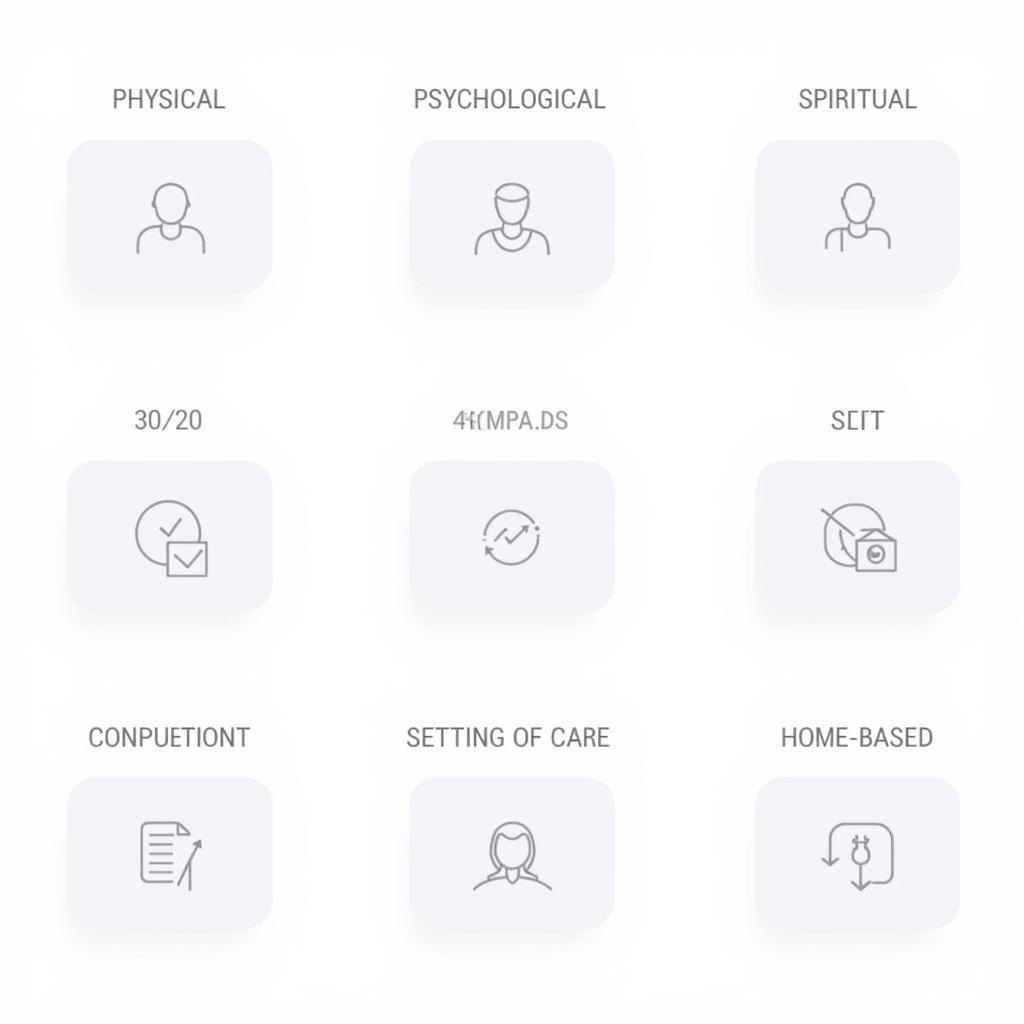Palliative Care Needs Assessment Tools play a crucial role in ensuring individuals facing serious illness receive the appropriate support and care. These tools help identify the physical, psychological, social, and spiritual needs of patients, allowing healthcare professionals to tailor interventions and improve quality of life. This article will delve into the importance of these tools, explore various types available, and discuss their application in different palliative care settings.
Understanding the Importance of Palliative Care Needs Assessment Tools
Effective palliative care relies on a thorough understanding of the individual’s unique needs. These needs can vary significantly based on the illness trajectory, individual preferences, and cultural background. Assessment tools provide a structured approach to gather this crucial information, ensuring no aspect of the patient’s well-being is overlooked. A comprehensive assessment enables healthcare providers to develop a personalized care plan that addresses the patient’s physical symptoms, emotional distress, social support needs, and spiritual concerns. Early identification of needs through these tools can also prevent crises and improve overall patient satisfaction. For instance, a patient experiencing significant pain might benefit from medication management, while someone struggling with anxiety could be referred for counseling.
patient and family centered care assessment tool
Exploring Different Types of Palliative Care Needs Assessment Tools
Various palliative care needs assessment tools are available, each with its own focus and application. Some tools focus primarily on physical symptoms like pain, fatigue, and nausea, while others delve into psychological and spiritual well-being. Some commonly used tools include the Edmonton Symptom Assessment System (ESAS), the Palliative Performance Scale (PPS), and the Memorial Symptom Assessment Scale (MSAS). Choosing the right tool depends on the specific needs of the patient and the setting of care.
Choosing the Right Tool for the Right Situation
 Choosing the Right Palliative Care Assessment Tool for Different Patient Needs
Choosing the Right Palliative Care Assessment Tool for Different Patient Needs
The selection of a palliative care needs assessment tool should be guided by several factors. The patient’s cognitive abilities are crucial; a patient with cognitive impairment may require a simpler tool or assistance from a family member. The setting of care also plays a role; a busy hospital environment might necessitate a quick and easy-to-use tool. Finally, the specific needs of the patient should be considered. A patient primarily struggling with pain management might benefit from a pain-specific assessment tool.
“Understanding the nuances of each assessment tool is paramount to ensuring accurate and effective patient care,” notes Dr. Emily Carter, a leading palliative care specialist. “Using the right tool for the right situation can significantly impact a patient’s quality of life.”
Integrating Palliative Care Needs Assessment Tools into Practice
person centered care assessment tool
Integrating these tools into routine practice requires a systematic approach. Healthcare professionals should be trained on the proper administration and interpretation of the chosen tools. Regular assessment and documentation are essential for tracking changes in the patient’s needs and adjusting the care plan accordingly. Open communication with patients and their families about the assessment process is also crucial. This fosters trust and ensures the patient feels heard and understood.
Ensuring Accurate and Consistent Assessments
Regular training and ongoing quality improvement initiatives can ensure the accurate and consistent use of these tools. “Regular calibration among team members is essential for ensuring consistency in assessment and interpretation,” adds Dr. David Miller, a seasoned hospice physician. This promotes accurate data collection and informs effective care planning.
holistic assessment tools in palliative care
Conclusion
Palliative care needs assessment tools are indispensable for providing high-quality, patient-centered care. These tools help identify the multifaceted needs of individuals facing serious illness, allowing for tailored interventions and improved quality of life. By understanding the different types of tools available and integrating them effectively into practice, healthcare professionals can ensure that patients receive the comprehensive and compassionate care they deserve. Using palliative care needs assessment tools ensures a holistic approach, addressing the physical, psychological, social, and spiritual dimensions of care.
FAQ
- What are the benefits of using palliative care needs assessment tools?
- How often should palliative care needs assessments be conducted?
- Who can administer palliative care needs assessment tools?
- How can I access these tools?
- Are these tools applicable in all palliative care settings?
- What are some common challenges in using these tools?
- How can these challenges be addressed?
center to advance palliative care- palliative care screening tool
Are you curious about other assessment tools in healthcare? Check out our article on who emergency care system assessment tool.
Need assistance with Car Diagnostic? Contact us via WhatsApp: +1(641)206-8880, Email: [email protected] or visit us at 910 Cedar Lane, Chicago, IL 60605, USA. Our customer service team is available 24/7.

Leave a Reply